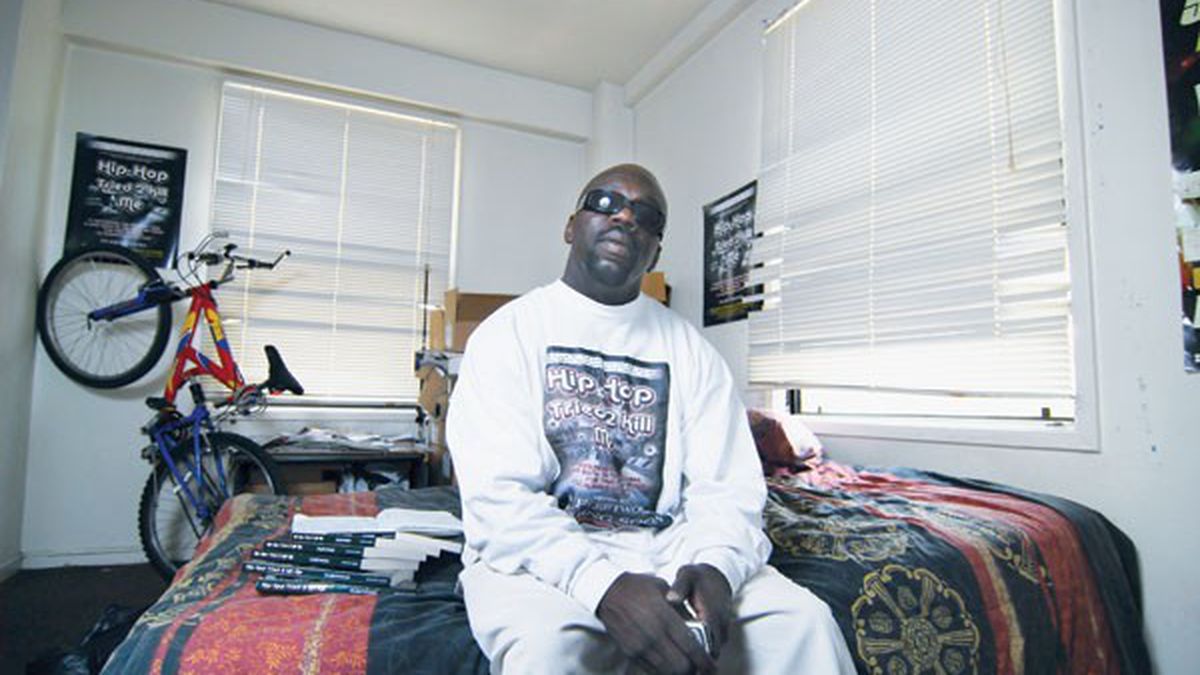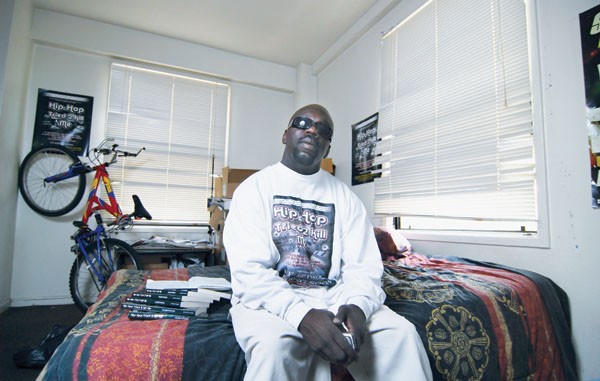Robert Bowden acquired the street name Fleetwood two decades ago from a Tenderloin prostitute. As he recounts in his new autobiography, Hip-Hop Tried 2 Kill Me, she said he reminded her of a Fleetwood Cadillac, “hard but you smooth.” It was a persona that Fleetwood cultivated during his days as a pimp and crack dealer. Now 46, he remains tough and resolutely self-disciplined.
Fleetwood served five years in several Minnesota state prisons, got out in 1997, and doesn’t plan to go back. Nonetheless, he tries to parlay that gangster mentality in the straight world. Since getting out, he has worked in homeless shelters, launched the nonprofit Homeboy Hotline to find housing and employment for ex-convicts, and written two book-length manuscripts in Mead notebooks. His favorite proverb is an alliterative phrase he learned while gang-banging in Chicago: “perception of proper preparation preventing poor performance.”
The furnishings in Fleetwood’s one-bedroom garret speak volumes about his preparation. The place is musty but organized, with everything filed away in its proper place. A whiteboard displays his June calendar, laid out in a neat grid with “Xs” marking the dates that have passed. Below it lies a small television, a bike, and a shelf stacked with paperback Bibles and gospel leaflets. Packs of Newport cigarettes, hardbound composition books, and $20 bills clutter the bed. Beside the bed hangs a Snoop Dogg poster plastered with yellow Post-it notes, all bearing fax numbers and bullet-point “To Do” lists. His apartment bears the look of someone trying to impose normalcy on a life that doesn’t come by it naturally.
On a recent Saturday morning, Fleetwood arrived fresh off his shift driving a cab in San Francisco. He works from midnight to 9 a.m., parks the taxi in West Oakland, and catches BART back to 12th Street station, roughly three blocks from his apartment building. Then he begins a strict daily routine learned from his Baptist upbringing and from the six months he served in a military-style boot camp: bedside prayers, followed by one hundred push-ups, before he moves on to the day’s tasks. Even during an interview, Fleetwood flitted about the room, unable to sit down. He did forty push-ups, brushed his teeth, shaved off his five o’clock shadow, put on deodorant, said his prayers, and started checking things off a list scrawled on one of his Post-its (one item said “interview”). He smoked two cigarettes in the course of an hour and kept talking even as he exhaled, the smoke coming out in jolty puffs. He set a change of clothes on the bed, sprayed water on a T-shirt and ironed it, then took off the jersey he was wearing at work. His back was a patchwork of stab wounds from a robbery attempt several years ago. A deep scar ran from his navel halfway up his chest.
Fleetwood came up in a world where the good guys were perilously close to the bad guys. His father — Rudolph “Sonny” Bowden — was a heroin kingpin in San Francisco who wore long leather coats and cavorted with R&B singers. In Fleetwood’s recollection, the elder Bowden always had a nice house with a billiards room and a swimming pool in the backyard. He was a deep-pocketed celebrity crime boss with strong ambitions and a cruel demeanor. “My dad was an enforcer,” Fleetwood remembers. “All our conversations were, ‘Boy what’s wrong with you?’ He told me one thing I never forgot in my life. He said, ‘Ain’t nothing in this world you ever gonna be able to do better than me. Nothing.’ That always affected me and hurt me. I never liked him for that.” But Fleetwood also lionizes his dad, and even has the man’s photo posted on his MySpace page. Taken in 1974, the photo shows Bowden wearing a long fur coat and a knowing grin. The caption reads, “Stunt Like My Daddy (r.i.p.).”
Fleetwood’s father died of a diabetic seizure in 2003. His mother, who divorced Bowden and moved the family to North Carolina in 1965, died of breast cancer when Fleetwood was seventeen. In the first chapter of Hip-Hop Tried 2 Kill Me, he characterized her as a kind of moral compass, perhaps an antidote to his enterprising, arch-capitalist father. She was a social worker and church usher who sewed cheerleading outfits for girls in the neighborhood, and helped fix their hair for Sunday service. On the day of her death, Fleetwood was sitting in his crib smoking weed with his homeys. He described the event in flat, numbing prose: “We went and got some more weed and beer then went and sat in the park. The sun was just comin’ up and it seemed like the rays of light was talkin’ to me, tryin’ to guide me somewhere but I couldn’t understand where.”
Although Fleetwood allowed himself, at many points in the book, to come across as an unsympathetic character (particularly when he recalls pimping women in the Tenderloin, or bringing crack into inner-city neighborhoods), the author’s tender side also strained to come to the surface. The criminally minded Fleetwood ran a drug empire with a business model similar to that employed by Avon Barksdale in The Wire. The moral Fleetwood breaks into tears when asked how long he’s been smoking cigarettes, because it reminds him of his mother’s cancer. The ambitious Fleetwood started handwriting his first book last year, while living in a homeless shelter. The obsessive Fleetwood takes a maximalist approach to life, sleeping only a couple hours a night. (“Don’t nothing come to a sleeper but a dream,” he says, quoting advice from his homeys in the pen.)
Fleetwood’s colorful personality shines through the pages of Hip-Hop Tried 2 Kill Me, which is written in the same slangy, gossipy tone that he uses in normal conversation. (He retains all the “feel mes,” “ya know what I’m sayins,” and uses the abbreviated, phonetic spellings you’d find in a MySpace message.) It’s full of aphorisms, morality tales, and advice gleaned from the author’s abortive rap career. He describes prison from the perspective of someone inside, without casting himself as a victim.
He approaches marketing a book much like an emcee trying to hustle rap albums: He enlisted a Cal student and Oakland Post writer to help edit the manuscript, published 1,000 copies independently (through his company UAintGetInMy Publishing), and sells them hand-to-hand, or at small black-owned bookstores. Asked whether he’s worried about switching to “the book game” given the recent decline in print literature, Fleetwood says he’s not tripping. He still sees many people reading on public transportation. The trick in selling a book, he says, is to “define your target audience.”
Fleetwood’s target audience? “People who love art. Anybody who loves art can appreciate Hip-Hop Tried to Kill Me.“













